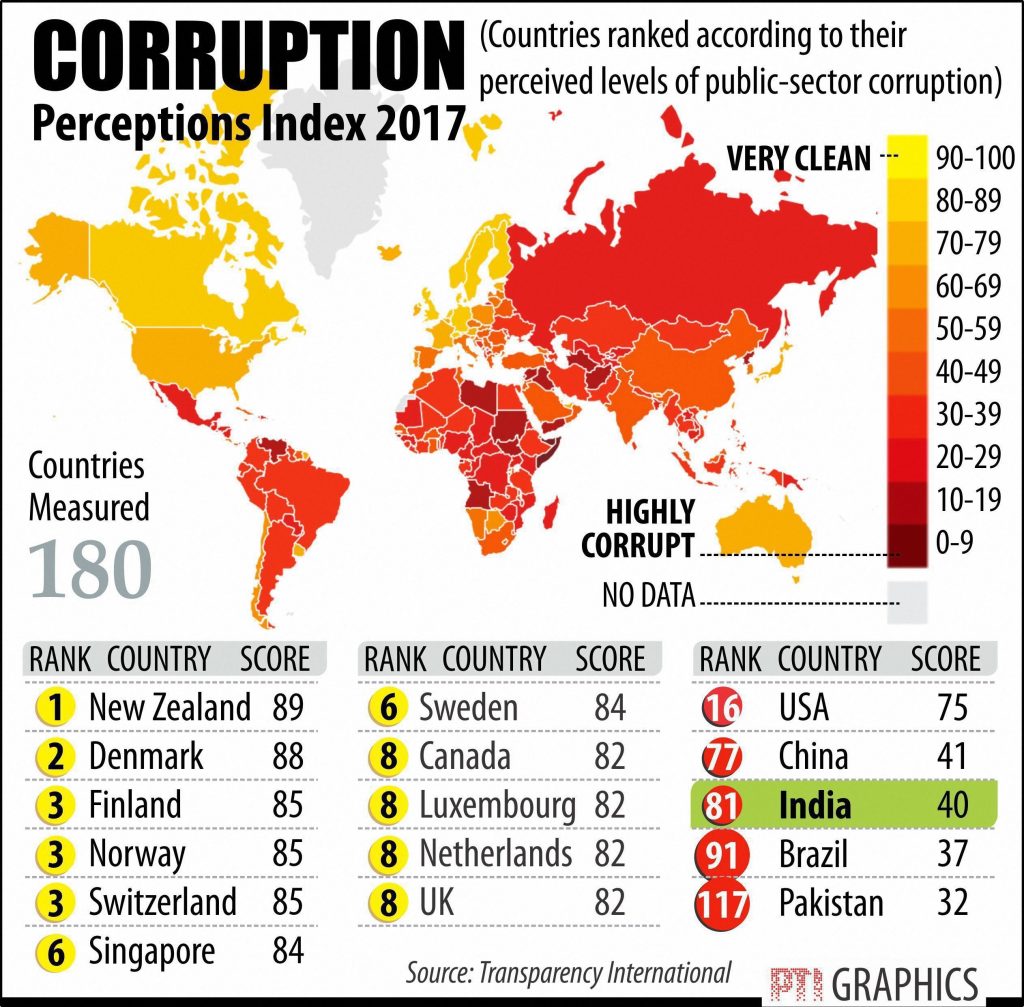
This year’s Corruption Perceptions Index highlights that the majority of countries are making little or no progress in ending corruption, while further analysis shows journalists and activists in corrupt countries risking their lives every day in an effort to speak out.
The index, which ranks 180 countries and territories by their perceived levels of public sector corruption according to experts and businesspeople, uses a scale of 0 to 100, where 0 is highly corrupt and 100 is very clean. This year, the index found that more than two-thirds of countries score below 50, with an average score of 43. Unfortunately, compared to recent years, this poor performance is nothing new.
This year, New Zealand and Denmark rank highest with scores of 89 and 88 respectively. Syria, South Sudan and Somalia rank lowest with scores of 14, 12 and 9 respectively. The best performing region is Western Europe with an average score of 66. The worst performing regions are Sub-Saharan Africa (average score 32) and Eastern Europe and Central Asia (average score 34).
Since 2012, several countries significantly improved their index score, including Côte d’Ivoire, Senegal and the United Kingdom, while several countries declined, including Syria, Yemen and Australia.
RESEARCH ANALYSIS
Further analysis of the results indicates that countries with the least protection for press and non-governmental organisations (NGOs) also tend to have the worst rates of corruption.
Every week at least one journalist is killed in a country that is highly corrupt.
The analysis, which incorporates data from the Committee to Protect Journalists, shows that in the last six years, more than 9 out of 10 journalists were killed in countries that score 45 or less on the index.
TOP FIVE RECOMMENDATIONS
Our first-hand experience working in more than 100 countries around the world shows that activists and media are vital to combatting corruption. As such, Transparency International calls on the global community to take the following actions to curb corruption:
- Governments and businesses must do more to encourage free speech, independent media, political dissent and an open and engaged civil society.
- Governments should minimise regulations on media, including traditional and new media, and ensure that journalists can work without fear of repression or violence. In addition, international donors should consider press freedom relevant to development aid or access to international organisations.
- Civil society and governments should promote laws that focus on access to information. This access helps enhance transparency and accountability while reducing opportunities for corruption. It is important, however, for governments to not only invest in an appropriate legal framework for such laws, but also commit to their implementation.
- Activists and governments should take advantage of the momentum generated by the United Nations Sustainable Development Goals (SDGs) to advocate and push for reforms at the national and global level. Specifically, governments must ensure access to information and the protection of fundamental freedoms and align these to international agreements and best practices.
- Governments and businesses should proactively disclose relevant public interest information in open data formats. Proactive disclosure of relevant data, including government budgets, company ownership, public procurement and political party finances allows journalists, civil society and affected communities to identify patterns of corrupt conduct more efficiently.

NEW DELHI: CORRUPTION. PTI GRAPHICS(PTI2_22_2018_000112B)
Source: Transparency International and compiled by The Naga Republic





 An orbiting message of peace
An orbiting message of peace Meet R.N. Ravi, who is mediating peace with the Nagas
Meet R.N. Ravi, who is mediating peace with the Nagas The last Konyak headhunters of Nagaland
The last Konyak headhunters of Nagaland The Top Viral YouTube Videos of 2017
The Top Viral YouTube Videos of 2017










Leave a Reply
Your email address will not be published. Required fields are marked (required)